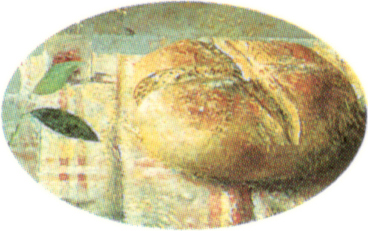
Bread, God’s Grace
I don’t recommend baking bread; it can become a dangerous passion. Some years ago I bought an amazing machine into which, employing the appropriate opening, I introduced flour, yeast, and water, and adjusted a clock; the next morning, at the exact hour, we were awakened by the fragrance of freshly baked bread. How that transmutation occurred is something that will live on in the realms of mystery. Soon, however, the consequences became obvious on the waistlines of the adult members of the family and in the implacable refusal of the children to draw their nourishment from proteins or vegetables—all they wanted were rings, rolls, braids, and other breads. In view of which we decided to retire the machine from circulation. It sat abandoned in the garage for several months until my stepson Harleigh, he of the funereal tattoos, had the idea of changing a few pieces, adjusting a couple of screws, and using it to convert marijuana into chocolate cookies, which he sold at school at great profit. That was my one attempt at making bread.
Like poetry, baking is a rather melancholy vocation, whose primary requirement is free time for the soul. The poet and the baker are brothers in the essential task of nourishing the world.
If you insist on writing verses and making your own bread, skip this chapter, it’s not for you. People who need to experience everything, even if only once, sooner or later fall into the temptation of bread making. In such cases, I suggest compensating for the skill naturally absent in a beginner by giving the shape of the bread an amusing twist. In that vein, I gave my mother a pan in the shape of Il Santo Membro, as they sometimes call the male organ in Italy, whether out of arrogance or irony, I don’t know. After baking, however, the loaf was embarrassingly voluminous, and my mother hasn’t dared serve it for fear of humiliating the octogenarian gentlemen who come to her home for five o’clock tea. In the erotic kitchen, bread is an indispensable accompaniment—wheat is considered aphrodisiac and is a symbol of fertility—but preparing it consumes hours that could better be employed in bed. My advice is to buy bread from a good bakery without any guilt whatsoever and forcefully renounce the patient art of working dough, because one can do only so much in this life.
In a story by Guy de Maupassant, the young servant of a bourgeois household goes every morning with her basket over her arm to buy bread. Through a window she sees a young baker kneading dough and carries with her the image of his broad shoulders, his powerful arms, the gleam of sweat on his skin, and those sensual hands, kneading and kneading the dough with a lover’s patient determination, just as she would like hands to fondle her. And since this is a love story, her fantasy is fulfilled, with interest. The sight of one of those large country loaves inevitably brings back to me the memory of Maupassant’s baker and his hands in the dough and on the firm flesh of the girl. There are hands and hands, some thick and clumsy, others small and strong, there are light and timid hands, large and gentle hands, but for making bread and making love, what matters is the intent that guides the hands.

En la Cocina, painting by Antonio López-Garcia © 1997 Artists Rights Society (ARS), New York/VEGAP, Madrid.
In Chile the most popular bread is called marraqueta and is shaped like vulvae. In France it is the baguette; though phallic in appearance, it is not phallic in temperament, since it is modest, trustworthy, and never failing. It can be bought in any civilized city, but nowhere is a baguette as crunchy outside and spongy inside as in Paris. If your menu calls for a different variety, pay no attention; your reputation can always be saved with a baguette, unless you need some pliable bread for an exotic dish, the kind you eat with your hands. The only drawback of the baguette is that since it contains no shortening, it grows stale within a matter of hours, which is why in France any respectable housewife buys bread twice a day. That kind of dedication, however, should not be demanded of anyone; you can resuscitate your baguette by sprinkling it with water and heating it in a conventional oven for a few minutes. If it is fossilized, soak it in milk and give it to the dog. But don’t even think of putting it in the microwave; that will shatter its soul, and its violated essence will turn to rubber.
Tonight,
like many without a lover,
I’m going to bake bread
push my knuckles
into soft dough.
—Haiku, Patricia Donegan
I remember the kitchen of a convent in Brussels, where I witnessed, with reverence, the mysterious comingling of yeast, flour, and water. A nun, not wearing her habit, with the shoulders of a stevedore and delicate hands of a ballerina, arranged the dough in round and rectangular loaf pans, covered them with white cloths washed a thousand times and then washed again, and left them to rise beside a window, on a large medieval wood table. As she worked, at the far end of the kitchen the simple, daily miracle of flour and poetry ensued, the content of the pans took on life, and a slow and sensual process evolved beneath those white napkins that were discreet sheets covering the nakedness of the unbaked bread. The raw dough swelled with secret sighs, moved softly, pulsed like a woman’s body in the surrender of love. The acid odor of the fermenting dough blended with the intense and vigorous breath of newly baked loaves. And I, sitting on a penitent’s bench in a dark corner of that vast stone room, immersed in the warmth and fragrance of that mysterious process, wept, without knowing why.